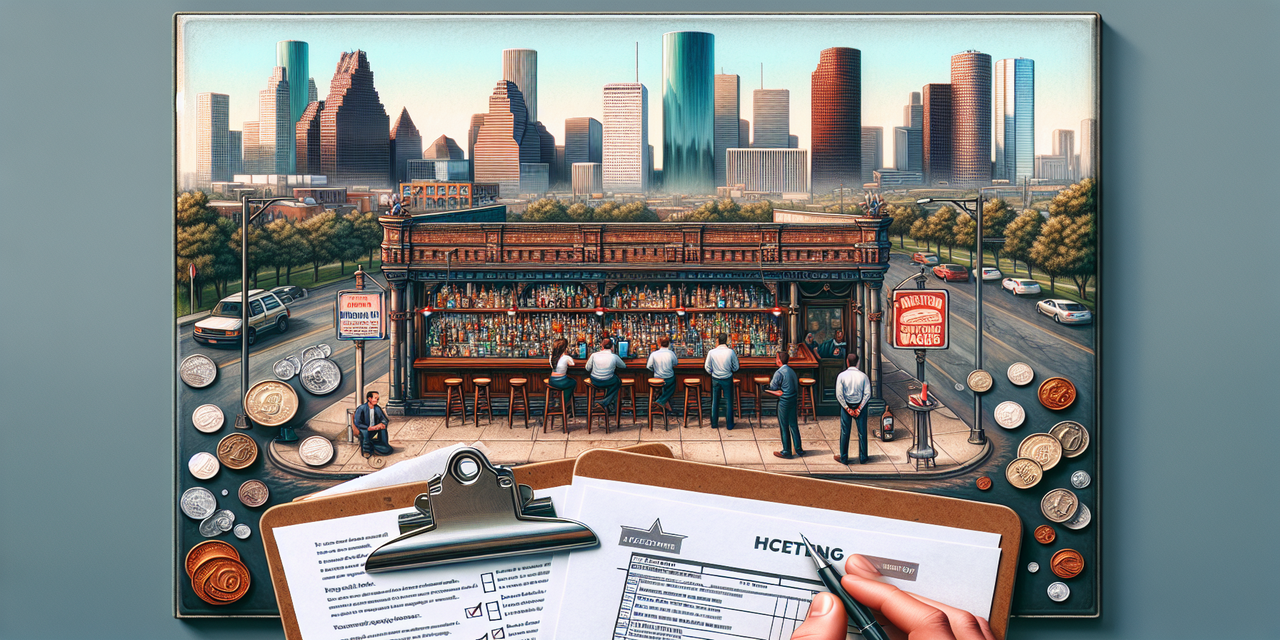Hiring Bartender in Houston: Local Wage Laws and Hiring Checklist: Key Takeaways
- Texas follows the federal minimum wage of $7.25, with a tipped minimum wage of $2.13 per hour for bartenders
- Houston bartenders earn an average of $16.36 per hour plus tips averaging $150 daily
- Essential hiring steps include age verification, TABC and Food Handler certifications, background checks, and thorough training
Hiring a bartender in Houston requires knowledge of local wage regulations and a clear hiring process.
This guide covers essential wage laws and a practical hiring checklist for Houston employers.
For actionable recruiting tips, see hiring a bartender.
1. Understanding Local Wage Laws for Hiring Bartenders in Houston
Texas adheres to the federal minimum wage, currently set at $7.25 per hour. For bartenders, who typically receive tips, the law allows employers to pay a cash wage as low as $2.13 per hour.
However, the combined total of wages and tips must at least equal the $7.25 minimum. This system permits bartenders to earn a substantial portion of their income through tips.
In Houston specifically, data shows bartenders earn an average hourly wage of about $16.36, with tips adding roughly $150 daily. This reflects a strong tipping culture that significantly boosts bartender income.
For pay benchmarks by market and role, see bartender salary.
Minimum Cash Wage and Tip Credit Rules in Texas
Employers can take advantage of the federal tip credit, paying tipped employees a base wage of $2.13 per hour, but must ensure total compensation with tips meets or exceeds $7.25.
If bartenders’ tips fall short, employers are responsible for making up the difference. Failure to comply can result in wage violations and penalties.
2. Essential Hiring Checklist for Bartenders in Houston
Employers need to follow a thorough checklist to hire well-qualified bartenders while staying compliant with local laws.
Build your posting faster with this bartender job description.
Age Requirement
In Texas, the minimum legal age to serve alcoholic beverages is 18. Employers must verify that candidates meet this age criterion before hiring.
Confirm current rules with this guide to the legal age to serve alcohol.
TABC Certification Is Highly Recommended
Although not legally mandatory, obtaining Texas Alcoholic Beverage Commission (TABC) certification is a best practice.
This certification educates bartenders about responsible alcohol service and helps protect employers under the Safe Harbor provision if violations occur.
Food Handler Permit Requirement
Bartenders qualify as food handlers in Texas. They are required to obtain a Food Handler's Permit within 60 days of starting employment.
This certification ensures bartenders understand essential food safety practices, helping maintain health code compliance.
Evaluating Experience and Skills
It’s critical to assess candidates’ prior experience in bartending or related hospitality roles. Key skills include customer service, drink preparation knowledge, and the ability to manage high-volume service efficiently.
For advanced beverage roles, review the mixologist job description.
Conducting Background Checks
Perform background checks to verify employment history and identify any criminal records that may affect the applicant’s suitability.
This step helps maintain a safe working environment and upholds the establishment’s standards.
Learn what to consider with restaurant background checks.
Interview Process for Assessing Candidate Fit
During interviews, evaluate interpersonal skills, stress management, and understanding of Texas alcohol laws.
Use structured techniques from this guide to interviewing bartenders.
A candidate’s ability to communicate well under pressure is essential for a successful bartender.
Prepare your questions with these bartender interview questions.
Training New Hires on Policies and Safety
Provide new bartenders with comprehensive training covering company policies, responsible alcohol service techniques, and emergency protocols.
This ensures compliance and promotes a safe, customer-friendly environment.
3. Best Practices and Useful Resources for Hiring Bartenders in Houston
To streamline hiring and compliance, employers should implement best practices and utilize official resources.
- Verify age and certifications prior to hiring
- Encourage or require TABC certification to reduce legal risks
- Ensure new hires quickly obtain their Food Handler's Permit
- Maintain clear documentation of training and background checks
- Create a positive onboarding experience to retain quality bartenders
Official websites for guidance include:
- Texas Alcoholic Beverage Commission (TABC) for responsible beverage service info and certification details
- Texas Department of State Health Services – Food Handler Program for permit requirements and application
- U.S. Department of Labor – Minimum Wage Information for federal wage regulations and updates
Hiring Bartender in Houston: Local Wage Laws and Hiring Checklist: Conclusion
Houston employers looking to hire bartenders must carefully navigate federal wage laws and local certification requirements.
By understanding tip credit rules, verifying age, encouraging TABC certification, securing a Food Handler's Permit, and conducting thorough interviews and background checks, employers can build a professional, compliant bartending team.

.png)

.png)
.jpg)